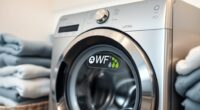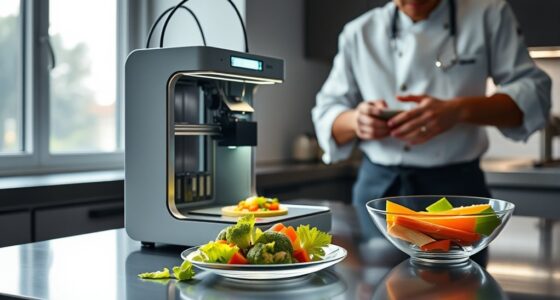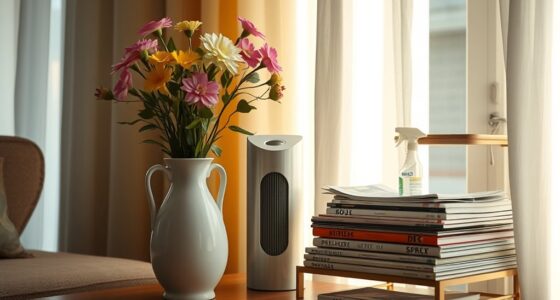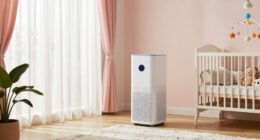When choosing appliances with a high Integrated Modified Energy Factor (IMEF), you can markedly improve energy efficiency and lower your utility bills. These appliances consume less power while maintaining effectiveness, helping you save money and reduce your environmental impact. Many certified models meet strict standards, ensuring reliable performance. Plus, local incentives like rebates and tax credits can offset costs. Keep exploring to discover how to select top-performing, eco-friendly appliances that maximize your savings.
Key Takeaways
- IMEF evaluates appliances’ overall energy efficiency, combining energy use and effectiveness for informed selection.
- Higher IMEF values indicate more efficient appliances that can reduce utility costs and environmental impact.
- Consider IMEF alongside certifications like Energy Star to ensure verified efficiency standards.
- Regional incentives and rebates can offset costs when choosing appliances with high IMEF.
- Prioritize appliances with high IMEF to maximize energy savings, sustainability, and long-term affordability.
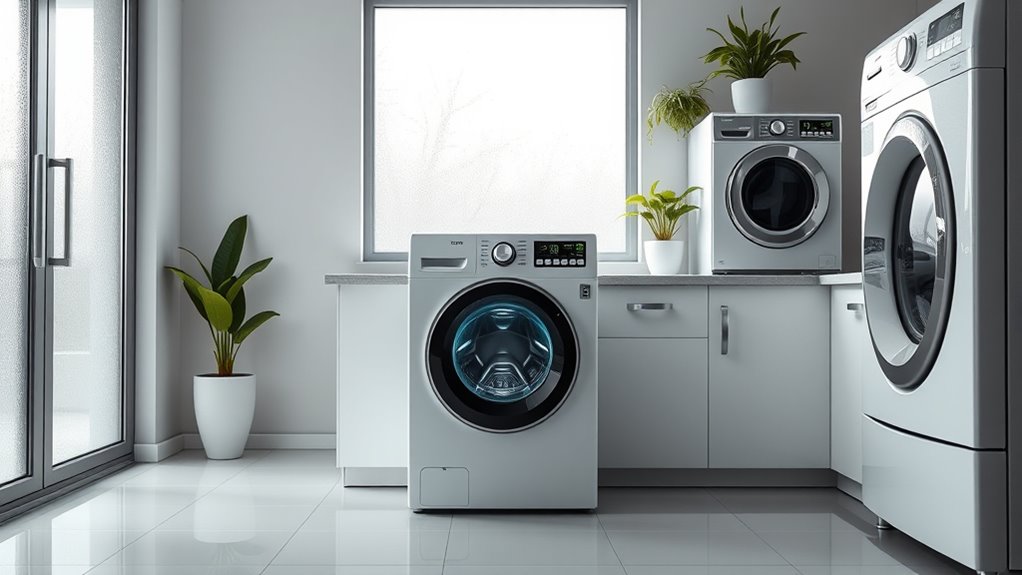
Are you looking for ways to cut energy costs and reduce your environmental impact? One of the most effective strategies is choosing appliances with high efficiency ratings, especially those that meet or exceed the standards set by the Integrated Modified Energy Factor (IMEF). This measurement helps you identify appliances that consume less energy while performing their tasks effectively. When shopping for new appliances, it’s wise to pay attention to the IMEF because appliances with higher efficiency can substantially lower your utility bills over time. Not only do these appliances save you money, but they also lessen your carbon footprint, making your home more eco-friendly.
Choosing high-efficiency appliances with IMEF can lower bills and reduce your carbon footprint.
In addition to focusing on the IMEF, you should explore available solar incentives that can offset the initial costs of energy-efficient appliances or renewable energy systems. Many local governments and utilities offer rebates, tax credits, or other incentives for installing solar panels or purchasing energy-efficient appliances. Taking advantage of these incentives can accelerate your investment return and make upgrading your appliances more affordable. It’s worth researching what programs are available in your area because they can vary widely and may include discounts on appliances tested for higher efficiency or benefits for integrating solar power with your household energy system.
Before making a purchase, you should also consider appliance testing results. Reputable manufacturers conduct rigorous testing to certify that their appliances meet strict energy efficiency standards. These tests ensure that the appliance performs reliably while consuming the least amount of energy possible. When you buy appliances with verified testing results, you gain confidence that you’re investing in a product that truly delivers on its efficiency claims. Look for Energy Star labels or similar certifications, as these indicate the appliance has undergone thorough testing and meets or exceeds efficiency benchmarks, including those related to the IMEF. Additionally, understanding the role of incentives and certifications can help you make more informed and cost-effective choices.
Choosing appliances with a high Integrated Modified Energy Factor means you’re prioritizing energy savings and environmental responsibility. It’s a smart move that pays off in lower energy bills and a reduced carbon footprint. Combining this with available solar incentives can make the transition even more cost-effective. Remember to research and verify appliance testing results to ensure you’re selecting products that are genuinely efficient. By doing so, you’re not only making a financially savvy choice but also contributing to a more sustainable future. Small steps like selecting efficient appliances and leveraging incentives can lead to substantial long-term benefits, making your home more energy-conscious and environmentally friendly.
Frequently Asked Questions
How Is the Modified Energy Factor Calculated for Different Appliances?
You calculate the Modified Energy Factor (MEF) by considering the appliance’s energy consumption, water use, and cycle efficiency. It combines energy calculation and efficiency metrics, measuring how much energy the appliance uses per cycle relative to its cleaning performance. To determine the MEF, you divide the total cycle energy by the amount of laundry cleaned, with higher MEF values indicating more efficient appliances.
What Are the Best Practices to Improve Appliance Efficiency?
Think of your appliances as a well-tuned orchestra; maintenance keeps each instrument playing smoothly. To boost efficiency, regularly clean filters and vents, perform timely repairs, and upgrade to smart technology that monitors usage. Smart tech acts like a conductor, optimizing performance and reducing waste. By maintaining your appliances and embracing intelligent systems, you guarantee they run efficiently, save energy, and extend their lifespan, making your home greener and more cost-effective.
How Does Energy Factor Influence Long-Term Savings?
Energy factor directly impacts your long-term savings by showing how efficiently an appliance uses energy. A higher energy factor means less energy consumption, leading to lower utility bills and significant cost savings over time. Additionally, choosing appliances with better energy factors reduces environmental impact by decreasing energy demand and emissions. By prioritizing these, you not only save money but also contribute to a greener, more sustainable environment.
Are There Government Incentives for Energy-Efficient Appliances?
Yes, you can benefit from government incentives like rebate programs and tax credits when buying energy-efficient appliances. These programs aim to lower your upfront costs and encourage sustainable choices. Check local and federal resources to find available incentives in your area. Taking advantage of these opportunities helps you save money now and reduces your energy bills long-term, making your appliance purchase both eco-friendly and budget-friendly.
Can Appliance Efficiency Ratings Vary by Brand or Model?
Did you know some appliances can use up to 30% more energy depending on brand and model? Yes, efficiency ratings can vary considerably, so when you compare brands and models, you might find major differences in energy use and costs. Always check the label and compare the specifications. This way, you guarantee you’re choosing the most efficient option, saving money and helping the environment in the long run.
Conclusion
Choosing appliances with a high Integrated Modified Energy Factor can cut your energy use by up to 30%. Did you know that replacing just one old dishwasher with an ENERGY STAR model can save enough energy to power your TV for over 150 hours annually? By picking efficient appliances, you’re not only saving money but also helping the environment. So, make smart choices today—your wallet and the planet will thank you!

